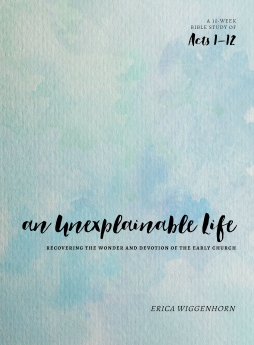Erica Wiggenhorn, author of An Unexplainable Life: Recovering the Wonders and Devotion of the Early Church, is our guest blogger and Erica and I both have a heart for the church today to learn from the church of the past to impact our current culture. In Forsaken God?: Remembering the Goodness of God Our Culture Has Forgotten, I trace the mishaps of the Israelites and how we can learn from their mistakes and forgetfulness of God’s goodness. Erica traces the biblical conflict that started right from the beginning of the church and offers solutions of how to confront inevitable conflict in the current church that is sadly influencing our culture away from God and the church. I’ve also written about resolving conflict biblically in Face-to-Face with Euodia and Syntyche: From Conflict to Community.
I also wrote a recent article for Crosswalk.com you might enjoy reading, Biblical Responses for When the Church Offends or Hurts You.
Enjoy and pray about Erica’s post below.

Author/Mentee Erica Wiggenhorn
One of the very first things I noticed about the early Christian church is that trouble started right away. The church was barely a week old before issues arose.
This shouldn’t be a surprise since the Christian church is made up of people—flawed, imperfect human beings. Yet we are somehow shocked today when issues occur within the church. We shake our heads in disbelief when believers disagree with one another, or are outraged when others come against the church because we don’t condone their lifestyle or support their beliefs.
[Tweet “The early Christians in the book of Acts realized that regardless of what they faced, God was on their side and the church was going to continue.”]
The church should expect opposition within its walls and without. By living in a false mentality that the Christian church will perpetually function in peace and unity, we are deceived into not dealing with it. We think something is wrong. But what if we opened up the pages of Scripture, realized that there have always been issues, and therefore actively prepared for them? What if we intentionally wrestle and pray through difficulties before they even arise?
[Tweet “Disagreement and opposition are nothing more than the enemy’s plans to thwart the church.”]
Disagreement and opposition are nothing more than the enemy’s plans to thwart the church. Here are just a handful of accusations that came against the early Christian church within weeks of its inception:
- Prejudice
- Favoritism
- Insurrection
- Governmental and social unrest
- Hypocrisy
- Deceit
How many of these do we see today? Nothing has changed, friends. But what if we changed, went back to the beginning, and prayed specific, powerful prayers like the early believers did?
[Tweet ” Nothing has changed, friends. But what if we changed, went back to the beginning, and prayed specific, powerful prayers like the early believers did?”]
How Should We Respond? What Should We Do?
[Tweet “Next time you feel overwhelmed by cultural opposition—pray. Next time you’re discouraged by disunity within your church—pray. Even before either one happens—pray, because it’s going to happen. Make sure you’re ready.”]
“You spoke by the Holy Spirit through the mouth of your servant, our father David: ‘Why do the nations rage and the peoples plot in vain? The kings of the earth rise up and the rulers band together against the Lord and against his anointed one’ … Now, Lord, consider their threats and enable your servants to speak your word with great boldness.” (Acts 4:25-26, 29)
Look at what God did as a result of this prayer: “After they prayed, the place where they were meeting was shaken. And they were all filled with the Holy Spirit and spoke the word of God boldly.” (Acts 4:31)
God gave them a visible demonstration that His power was mightier than Rome’s greatest emperor! The early Christians didn’t cower in the corner wringing their hands because they faced opposition. They confronted it head-on by addressing the One powerful enough to help them overcome it! They prayed to God. The early Christians in the book of Acts realized that regardless of what they faced, God was on their side and the church was going to continue.
[Tweet “But what if we opened up the pages of Scripture, realized that there have always been issues, and therefore actively prepared for them? “]
God has warned us that we need to prepare for disagreement and opposition. We need to prayerfully decide how we are going to respond to difficult issues. We need to study the Word of God so we are aware of our enemy’s schemes.
We need to realize that trouble is often our greatest indicator that our enemy is threatened and God is at work. And as we study, pray, and come together with other believers wrestling through issues and injustices, the Holy Spirit will move with power—wall shaking power—and give us everything we need to continue to spread the news of Jesus! Two thousand years later, the gospel is still spreading!
[Tweet “The early Christians didn’t cower in the corner wringing their hands because they faced opposition. They confronted it head-on by addressing the One powerful enough to help them overcome it!”]
Next time you feel overwhelmed by cultural opposition—pray. Next time you’re discouraged by disunity within your church—pray. Even before either one happens—pray, because it’s going to happen. Make sure you’re ready.
[Tweet “God has warned us that we need to prepare for disagreement and opposition. We need to prayerfully decide how we are going to respond to difficult issues.”]
[Tweet “Next time you feel overwhelmed by cultural opposition—pray. Next time you’re discouraged by disunity within your church—pray. Even before either one happens—pray, because it’s going to happen. Make sure you’re ready.”]
For more information about her latest Bible study, An Unexplainable Life: Recovering the Wonder and Devotion of the Early Church, and Erica’s Every Life Ministry click here.
Now It’s Your Turn
What is your general response when disunity occurs within your church?
How do you specifically pray for your church’s protection against cultural opposition?
What is one key way to prepare ourselves for opposition within our church or from without?
You can comment below or if you received this blog by email comment here.


Euodia and Syntyche: From Conflict to Community



















